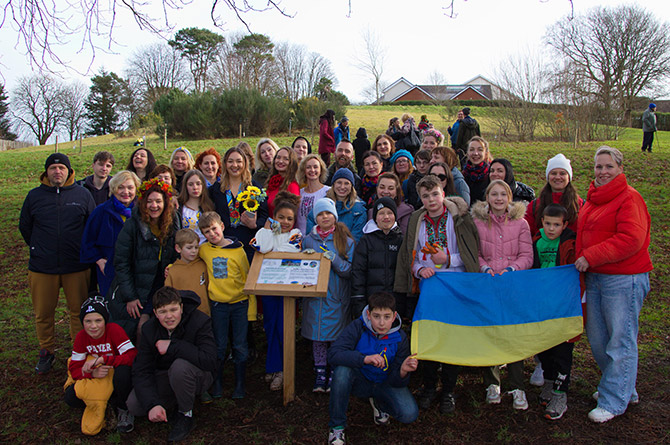Support quality, independent, local journalism…that matters
From just £1 a month you can help fund our work – and use our website without adverts. Become a member today

Reform UK insists it is more than a one-policy party, but in Caerphilly its campaign has centred on immigration, asylum seekers and the Welsh Government’s ‘Nation of Sanctuary’ scheme.
In a leaflet delivered to homes across the constituency, the party attacks Plaid Cymru leader Rhun ap Iorwerth’s call for “more migrants in some areas of Wales” and highlights comments from Plaid’s candidate Lindsay Whittle, who has argued that immigration “wasn’t a major issue affecting Caerphilly”.
Cllr Whittle has previously pointed to Wales’ internationalist tradition of welcoming people from other countries.
Reform’s candidate Llŷr Powell claims Plaid and Labour are “burying their heads in the sand” and pledges to oppose what he calls their “mass immigration agenda”.
He said: “Plaid Cymru’s position is clear: they want to see more, not less, immigration to Wales. Given half a chance, they will go further and faster on Labour’s Nation of Sanctuary by giving handouts to asylum seekers, whilst communities here in Caerphilly are left behind.”
While immigration policy is reserved to the UK Government, the Welsh Government controls the support services for those who arrive – such as language lessons, housing help and integration programmes – through its Nation of Sanctuary policy.
Census data
According to the 2021 Census, foreign-born residents made up just 2.9% of Caerphilly’s population — 5,193 people out of 175,952. This is the lowest out of Wales’ 22 local authorities.
The largest groups came from Poland, Romania, Ireland, South Africa and India. These figures were recorded before Russia’s invasion of Ukraine, which later brought about 130 refugees to the borough.
Of the 97.1% of residents born in the UK, 87.3% were born in Wales, 9.1% in England, 0.5% in Scotland and 0.2% in Northern Ireland.
In fact, Caerphilly’s overall population fell by 1.6% between 2011 and 2021, from 178,806 to 175,952. The biggest change was Welsh-born residents moving away, with a fall of 4,780, while 1,066 English-born residents moved into the county.
Nation of Sanctuary
The Welsh Government’s “Nation of Sanctuary” policy, launched in 2019, is a strategy to support and integrate refugees and asylum seekers by providing them with support – such as English language lessons – while their applications are processed.
Figures show the Nation of Sanctuary has cost around £55m since 2019 – of which £45m has been spent on supporting Ukrainian refugees.
Both Reform and the Conservatives have attacked and criticised the plan and are in opposition to it, while the Liberal Democrats have supported it, as does the Green Party.
Reform’s Mr Powell has said he would refuse to vote for any Welsh Government budget that included such spending. Critics warn that blocking a budget altogether could risk even deeper cuts to local services in areas like Caerphilly. If no budget is passed, ministers are legally limited to spending only 75% of the previous year’s budget until an agreement is reached – effectively a 25% cut across the board.
‘Sanctuary is not a weakness’
During questions to the Social Justice Minister Jane Hutt in the Senedd recently, Plaid’s South Wales East member Peredur Owen Griffiths said “toxicity” and “lies” spread by Reform and the Conservatives over the Nation of Sanctuary policy were causing “upset” among Welsh Ukrainians.
He told the chamber: “Sanctuary is not a weakness – it is one of Wales’ greatest strengths. When certain politicians attack Nation of Sanctuary, they are attacking the support given to Ukrainian refugees because this is where the vast majority of cash has gone – around 83% in fact.”
Yuliia Bond is a community leader for the Ukrainian refugees here in Caerphilly and has helped organise multiple community cultural events – such as the one held at the council’s offices on Friday September 19.
Speaking about the Nation of Sanctuary, she told Caerphilly Observer: “From my Ukrainian community, and from my Ukrainian refugee perspective, it’s very unfair that so much misinformation is being spread.
“People are just picking up slogans, without understanding that most of the funding was to support Ukrainians with integration, so they can actually contribute to the community.
“What is not mentioned is that immigration is not something the Senedd can control. Scrapping Nation of Sanctuary won’t stop people from arriving, but what it will actually do is stop people from being able to contribute, learn English, and integrate.”
She added: “The Ukrainian community feels upset as they’re being portrayed as a burden, which is not the reality. We are here to give and not to take.”
Yuliia recently met with Labour’s candidate Richard Tunnicliffe and the Welsh Government’s Social Justice Minister Jane Hutt to raise her concerns about Reform’s election claims.
Ms Hutt said: “What we need to do is put the record straight. This is about integration. We now have over 8,000 Ukrainians living and contributing to Wales.”

Mr Tunnicliffe said: “When I’ve been going out on the doors, some people have raised this issue. But as soon as you say ‘do you believe we should support Ukrainians fleeing the Russian invasion who need help to integrate?’ they say ‘that’s fine, that’s exactly what we want’. They’ve just been told something that isn’t true.”
The economic case
Supporters of immigration argue that what are sometimes portrayed as “handouts” are in fact investments in people who can then join the workforce.
There is, however, also the counter-argument that immigration puts pressure on already stretched public services and housing.
According to a briefing by the Migration Observatory at Oxford University, migrants often arrive in their prime working years, contributing through taxes, rent and local spending that supports both businesses and public services. Over the longer term, immigration also helps offset demographic challenges such as an ageing population and local population decline – both evident in Caerphilly’s latest Census results.
Examples of that contribution are already visible locally. Last month Caerphilly Observer reported how a family of Ukrainian refugees opened a new café at Caerphilly Railway Station, with support from the woman who first housed them.
Mr Tunnicliffe said: “Often immigrants are some of the most inventive and entrepreneurial people. We met with Coffi Kava and they were telling us the work they’ve done with local people. It is about our economy.
“We can see that with the NHS and social care, that immigration is vital in keeping these places going. People are only concerned about it being fair.”
Voters in Caerphilly will have their say in the Senedd by-election being held on October 23.
Caerphilly’s by-election candidates
- Welsh Liberal Democrats – Steve Aicheler
- Gwlad – Anthony Cook
- Wales Green Party – Gareth Hughes
- Welsh Conservatives – Gareth Potter
- Reform UK – Llŷr Powell
- Roger Quilliam – UKIP
- Richard Tunnicliffe – Labour
- Lindsay Whittle – Plaid Cymru
Support quality, independent, local journalism…that matters
From just £1 a month you can help fund our work – and use our website without adverts.
Become a member today
